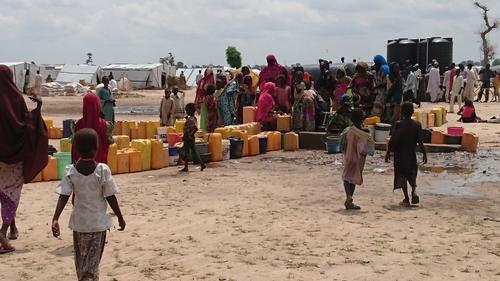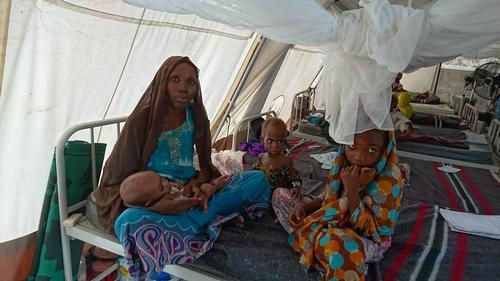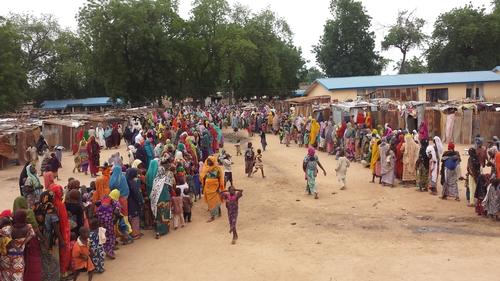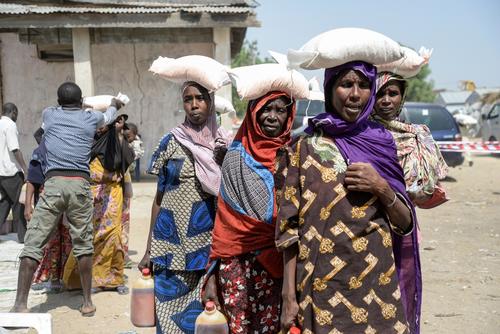The conflict in Borno State started in 2009 when Boko Haram launched attacks in Bauchi, Borno, Yobe and Kano. By 2014, Boko Haram controlled large swathes of territory in Borno State.
In 2015, Nigeria elected a new President who vowed to take back control of territory from Boko Haram and also stamp out corruption in the country. Since then the Nigerian army has been engaged in fighting with Boko Haram, including by launching airstrikes that began in 2016, in areas under Boko Haram control. The army has now taken back many cities and villages and is securing them.
The nature of the conflict between the Nigerian army and Boko Haram has changed to include military assistance from the neighbouring countries of Chad, Cameroon and Niger.

Boko Haram has carried out and continues to carry out attacks, suicide bombings and incursions in Borno State and also in neighbouring countries. As a result of the conflict, 2.7 million people are displaced across the four countries (Nigeria, Cameroon, Chad and Niger) according to Office for the Coordination of Humanitarian Affairs (OCHA).
MSF Projects
Maiduguri
MSF has been present in Maiduguri on a permanent basis since April 2014 working on paediatric and maternal health and nutrition and, on several occasions, cholera epidemics that were previously under control. Today, more than 1.2 million internally displaced people (IDP) are living in Maiduguri, most of them within the host community and others in camps (two informal camps and 13 official camps).
In Maimusari and Bolori health centres, we run outpatient departments (around 500 consultations per day in each location), ambulatory therapeutic feeding centres (ATFCs; 270 new admissions per week between the two sites) and maternity services (simple deliveries and antenatal and postnatal care consultations).
In Maimusari, the government has handed over a new building to MSF, which has allowed us to move from a basic health care centre to a comprehensive health care facility, including hospitalisation. MSF has opened an inpatient department with 50 beds for paediatrics and a paediatric intensive care unit, and will add 20 beds for adults.
In Gwange, a Maiduguri district, we now have an inpatient therapeutic feeding centre (ITFC) with a 110 bed capacity. Activity has consistently increased at the centre, reaching 92 admissions per week. The ITFC is under tents, in the compound of the MOH-run health centre, and should move to semi-permanent structures in the coming weeks to improve hygiene and quality of care. We plan to increase the capacity to 150-200 beds and identify another location to settle a second ITFC of a similar size to meet the increasing needs.
Bama
Between 13 and 15 June, Nigerian authorities and a local NGO organised the evacuation of 1,192 people requiring medical care from the Bama area to Maiduguri. This group of mostly women and children was placed in the “Nursing Village” IDP camp.
A team visited Bama with a military escort for the first time on 21 June and found people in a catastrophic situation. Out of the 800 children screened, 19 per cent were suffering from severe acute malnutrition. Estimated mortality at that time was very high. Medical data from the health centre reported 188 deaths between 23 May and 21 June, mainly from diarrhoea and malnutrition. Graves counted in the cemetery behind the camp showed more than 1,200 graves dug since the IDPs had been gathered in the hospital compound. Five children died during the assessment alone.
MSF returned to Bama in mid-July with a military escort. Bama is a ghost town, held by the army, where IDPs live in a camp inside the hospital compound. Despite authorities’ evacuation of 1,500 people and some food distribution, estimated malnutrition rates remain high, with severe acute malnutrition estimated at 15 per cent. An estimated 10,000 to 12,000 IDPs are living in very bad living conditions – shelters made of rusty corrugated iron sheeting – and are not allowed to move from the camp. There are almost no men or boys older than 12 in the camp.
A team arrived on 19 July to provide medical and nutritional support via ATFC and medical consultations, and also made water and sanitation improvements. A system for referrals to Maiduguri was organised with State Emergency Management Agency (SEMA) ambulances and school buses.
Damboa
In Damboa, southern Borno, the population is estimated to be between 50,000 and 60,000 people, many of whom are displaced from the surrounding area, now living in the town and three camps in the area. An MSF team has been on the ground treating patients in Damboa since 17 July and now has two clinics providing primarily health care and nutrition services. The majority of patients seen have presented with malnutrition and malaria, as well as diarrhoea and skin infections due to lack of hygiene. Malnutrition rates are particularly high, with an average of 10 to 12 per cent of children suffering from severe acute malnutrition. Since the start of the intervention, more than 4,000 patients have been treated, including 250 children for severe acute malnutrition.

Beni Shiekh
MSF is currently running several ATFCs in Beni Shiekh, the capital town of Kaga local government area (LGA). Malnourished children who need to be hospitalised are referred to the ITFC in Damaturu hospital (in the capital of Yobe State, located 62 kilometres west of Beni Shiekh), where MSF is also running a nutrition program.
Banki
From 19 to 22 July, an MSF team from Cameroon provided emergency medical assistance and delivered food in Banki, near the Cameroon border. Most of Banki’s estimated 15,000- to 20,000-person population are displaced people.
The situation in Banki is critical, with people restricted to the town for security reasons. There is a critical lack of healthcare, as well as food and water; no food stocks were present in the houses visited by MSF teams. Fourteen per cent of children screened by our teams are suffering from severe acute malnutrition, putting their lives at risk. Nearly one in three children is malnourished. A rapid survey found extremely high mortality rates, with a crude mortality rate (CMR) of 4.16 per 10,000 per day during the last six months, and a mortality rate (MR) of 6.2 per 10,000 per day for children under five years of age.
MSF provided therapeutic food to 4,948 children and vaccinated them against measles. A total of 3,600 families received emergency food aid and our teams were able to refer six people in critical medical condition to the hospital in Mora, Cameroon. We also conducted medical consultations and distributed soap and mosquito nets






